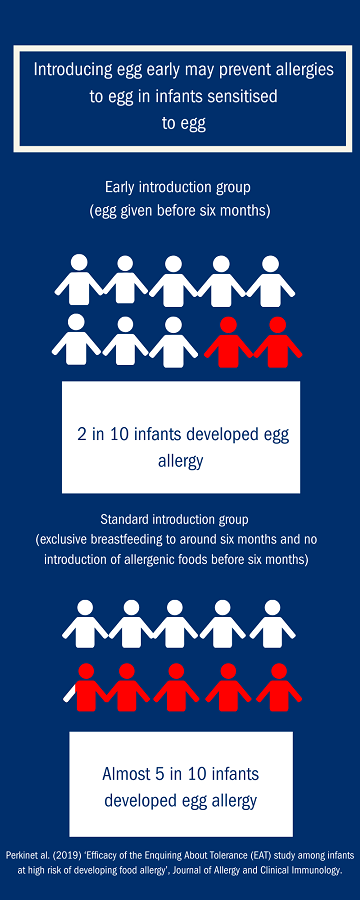Introducing peanuts and eggs early may prevent food allergies in infants
Published: 04 December 2019
Research by St George’s Dr Michael Perkin, in collaboration with colleagues at King’s College London, has found that introducing egg and peanut early to young children at high risk of developing food allergy may prevent them from developing food allergies.
The Enquiring About Tolerance (EAT) study involved 1,300 three-month old infants, and is the first large-scale clinical trial to investigate the early introduction of multiple foods, including peanut, egg, milk, sesame, fish and wheat. Exclusively breastfed infants were enrolled at 3 months of age. The children were randomly allocated to two groups: one which introduced the foods from three months alongside breastfeeding (early introduction), and the other which exclusively breastfed their infant to six months with no introduction of the six foods before this age (standard introduction).
Despite the fact that not all infants in the early introduction group ate the required amount of foods, the results showed that in certain groups of infants at high risk of developing food allergies, giving these foods early reduced the likelihood of developing allergies.

Among children who were already sensitised to one or more of the foods at enrolment, significantly fewer children developed any food allergy: 1 in 5 of the children in the early introduction group, compared to 1 in 3 in the standard introduction group.
Specifically for egg, among those infants sensitised to egg at enrolment, significantly fewer developed an egg allergy: 1 in 5 in the early introduction group, compared to 1 in 2 in the standard introduction group.
More research is needed to confirm these findings across large populations, but the results add to the body of evidence suggesting that early introduction of peanut and egg might protect against the development of allergies to these foods.
The researchers also explored why not everyone was able to follow the early introduction protocol. The reasons given included, children initially refusing foods, caregivers perceiving the foods to be causing allergic reactions, and practical lifestyle constraints. It’s hoped that addressing these issues and concerns could make it easier for caregivers to give the required amount of foods if infant feeding recommendations were to be updated.
Dr Michael Perkin, EAT Study Co-Principal Investigator from St Georges, University of London, said: “The early introduction of peanut and egg in specific groups of infants at high risk of developing allergy to these foods, may reduce their chances of developing food allergies. Our research adds to the body of evidence that early introduction of peanut and egg may help to curb the allergy epidemic.”
The researchers hope that the results of this study will be used to inform the debate around dietary interventions and their potential introduction into infant feeding guidelines.